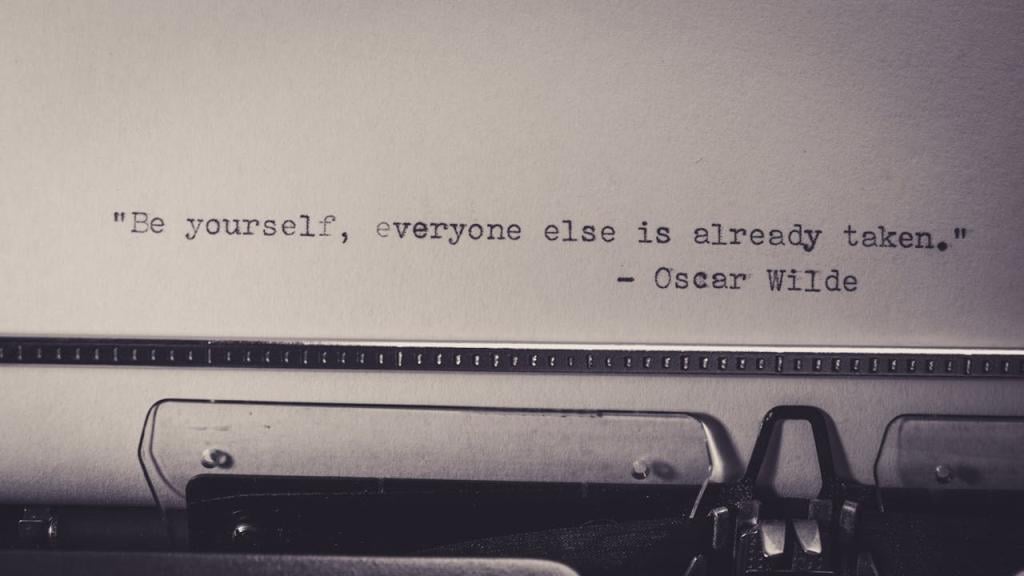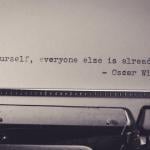
Excerpt from the book Copyright © 2025 by Karl Forehand
Learn to be Who You Are (Authenticity)
“Be yourself; everyone else is already taken.”
–Oscar Wilde
If you are walking away from religion or a high-control family, you will experience PTSD because, for most of your life, someone has told you who you should be, what you should do, or how you should believe. Now that you have separated and started asking more significant questions, you will experience an identity crisis that asks:
- Who am I?
- What do I like to do?
- What do I believe?
- How should I act?
- What are the rules?
- How do I set boundaries?
Most people who evolve out of religion are afraid to try new things since they believe in a slippery slope and that they will somehow plunge into an evil lifestyle. I can tell you from first-hand experience that I have investigated many things I knew nothing about. Some of them were things I wanted to practice; a few did not feel right, but many I wanted to keep investigating. None of these became my new religion, but they helped add to my authenticity because they are helping me discover who I am.
Integrity is essential to me. While I have many acquaintances who aren’t my closest friends, I find it difficult to tolerate those I do not respect. Integrity goes beyond simply telling the truth; it entails being honest about our true selves and avoiding self-deception.
For so long, someone determined those things for us. Job one in evolving after deconstructing old beliefs is deeply examining and discovering who we are. Before we start chanting mantras about what we want to do and accomplish, we should set an intention to start becoming who we are.
Fitting In
From my earliest memories, I felt a strong urge to fit in. Growing up in a low-income family, I not only struggled with my clothing choices but also faced challenges with my self-esteem due to my thick glasses, short stature, and the awkward way I carried myself, which stemmed from discomfort with almost everything. As a child, I often hid under the table when guests arrived. I frequently felt uneasy about others, convinced that if I could be a certain way, they would accept me, and I would feel more comfortable in their presence.
In junior high, I attended a private Christian school and an evangelical church in Oklahoma. I participated in Bible drills, answering questions about the Bible and quickly locating verses to earn candy rewards. I also participated in wrestling, football, and basketball, which fostered the concept of teamwork.
At first, I felt a sense of belonging because we all had similar haircuts and shared comparable values. We firmly believed that our viewpoints were right, and that God was on our side. Even though I initially doubted the church and the school, I went along with everything because it provided a sense of community. My ties to the cult, much like my experiences in both school and church, felt relatively stable until I began voicing my opinions and taking actions that genuinely resonated with me.
Despite my small stature, I learned to compete in athletics in high school. I got contacts to feel less self-conscious and cared about my appearance to some extent because I wanted girls to like me. When those in charge reacted or overreacted to my actions, my response was usually not an outright rebellion. Instead, I metaphorically crawled under the table and shrank enough so people didn’t notice me or what I was doing.
In high school, we moved to a much smaller town. There, staying unnoticed or blending into the crowd was much more challenging due to the group’s limited size. Our involvement in church activities significantly decreased because there was hardly any church presence. My primary strategy was committing to my work to fit into this farming community. Somehow, I envisioned a future as a computer programmer and believed that if I received enough education, I could secure a job and eventually relocate to a bigger city.
On my first day in Dallas, old feelings of inadequacy resurfaced, and I worried that I might never belong in such a large metropolitan area. I kept my head down for several years, focusing solely on learning and following the game’s rules. As my career progressed and I met my future wife, I became skilled at meeting others’ expectations. I constantly questioned anyone I regarded as wise, hoping their insights would help me find my place in the world.
This desire to fit in eventually made me a successful church planter. I was advised to understand the culture of the place where I would pastor, become like them, and do the things they do to fit in and be appreciated by them. It worked well, and we had good success at all three churches we led over the course of 20 years. At the first church, I learned to golf with parishioners and use my farming experience to spend time with the locals.
At my second church, I learned to hunt because one of the key members of the church was a hunter, and I genuinely enjoyed being around him and his family. Even though this took some of my time, it endeared me to the locals and helped me fit into the culture. As with many things, these hobbies were not inherently bad, but my desire to fit in sometimes caused me to go down paths that didn’t reflect my core understanding of what is ultimately best. I usually preached what they wanted me to preach. I behaved the way they wanted me to because fitting into the group was more manageable than being genuine and living authentically.
At the time, I was unaware that I was compromising my integrity. Their happiness and approval made me feel less insignificant, and they generally appreciated the outcomes. This made it relatively easy to maintain good relations, and everything seemed to work well until it didn’t. Eventually, I found myself taking firm stands, driven by my beliefs, or when I sensed that some church members were controlling and manipulative. This realization often indicated that it was time to relocate and begin the cycle of trying to fit in anew.
In my effort to fit in, I lost parts of my identity. To blend in with the group, I toned down my personality and adjusted my style to match their preferences. My sense of self became limited to their expectations and my ability to meet them. This challenge is common in nearly every job. Conforming to their desires may achieve career success, but we often compromise our uniqueness and integrity.
This inevitably leads to stress and trauma, yet we accept it as part of the process. During my deconstruction, I came to understand that I carried a degree of PTSD stemming from having surrendered my identity to the group for an extended period. My self-esteem would rise when I received their approval. Still, whenever I faced their rejection, even slightly, I felt a loss of confidence in being myself, which made it even more challenging to discern their expectations.
After 20 years in ministry, everything started to feel superficial and insincere. It felt more like a job than any genuine adventure. I achieved many of the goals and objectives I set for my life. I tried things I had never attempted before and went on adventures I never thought I would have. However, my career and ministry goals ultimately felt hollow because I knew I wasn’t being true to myself.
Deconstruction helped me realize where I was wounded and the deep pain of acknowledging that I wasn’t being myself and was playing a game that I didn’t want to play.
Playing the Game
Recently, my granddaughters came to visit, and it didn’t take long for them to want to show us the new game they had been playing. They were so excited about it that I made my way down to the floor to join in. Without much conversation, the game started, and I quickly had to ask them to stop and explain the rules to me.
This may stem from my childhood memories of these agreements. Back then, no one completely understood the rules, but they tried to apply the most sensible ones during our games. Consequently, I developed a habit of thoroughly understanding the rules before engaging in any activity. With a clear understanding of what was allowed, what wasn’t, and the criteria for success or failure, I could effectively navigate them myself to focus on achieving success, winning, or accomplishing nearly anything.
In my first real job in Dallas, I knew I had to complete a computer-based training course, which usually took about a year. I found out the acceptable grade I had to attain, and I worked hard according to the rules and gave up some of my personal time to complete the goal in half the time. I came to work on time and did my job the best I could according to the rules, and it usually paid off in quicker promotions and reviews.
When I became a pastor/church planter, I studied other people who had succeeded at what I was about to embark upon. I asked them how to proceed in a field where not everyone succeeded. They told me the game’s essentials and unspoken rules that genuinely made a difference, and I took their word for it. Part of it can be explained by the “fitting in” discussion previously, but they also taught me what people expected, what they would allow, and how to play the game successfully.
For most of my life, likely due to my deep-down timidity, I always started my endeavors by seeking to understand the rules, the best strategies, and a commitment to discovering why people act as they do. I became pretty skilled at playing the game. Although I was somewhat reserved and not a natural speaker—more of an introvert—I taught myself to navigate the game and did so quite successfully.
I progressed through parenting and pastoring churches for 20 years. I learned how to navigate the system and engaged with as much integrity and energy as possible until one day, I realized that even though I excelled in the game, I wasn’t playing the game I truly wanted to play. I was helping others achieve the church they desired. I supported someone else’s assumptions about what a proper belief system should be.
Although I was fitting in, I didn’t truly understand what authenticity meant because most of my efforts were focused on playing someone else’s game and helping them achieve their goals. When I finally grasped the concept of being authentic, my new dream of playing my own game began to come into focus. I suppose it starts with the question, “Who am I?” I will address this later in the questions.
Many of you have most likely experienced this realization sometime in your journey. You realize that playing games is part of what people do. Still, it usually involves less-than-desirable behavior, and to make it worse, we are usually playing a game that was initiated by someone else. We learn to manipulate and play roles that help us beat the system. People play games because they want to feel important and accomplish things. Using someone else’s system is easier because it promises a proven track record. It is why we join groups, work for other people, and do things that have already been done. We want to be on winning teams! So, we learn the rules, evaluate the competition, and play the game!
As we progress in our journey of discovery, we still discuss expectations and rules of engagement when dealing with other people and playing the game we want to play. But it’s very important to be authentic and to set boundaries with people so that we don’t devolve into manipulating and competing with others as we did in the past. The result is better relationships and genuine satisfaction at playing the game we want to play authentically, bringing us great satisfaction.
As with many things in life, the initial step we need to take is a step backward to discover who we are and what we really enjoy. We can’t launch into the game with our unprocessed trauma and our limited understanding. We might have to back up and change the launch point.
Changing the Launch Point
I have met lots of former pastors out here in the deconstruction desert. Pastors are used to being in charge, and everyone looks to them for answers and directions. So, when they step away from organized religion, they often move quickly into a more progressive stance and open their minds to new ideas. They are used to digesting topics quickly; before you know it, they write books about their new understanding. I admit that this is what I did, not so much to change the world but to document what I was discovering and process what I felt.
My old denomination encouraged us to start something new, which usually meant creating a new organization that would become a new church for the SBC. Ultimately, this increased revenue for the group and enhanced their satisfaction with accomplishing something.
But creating something new is not what I would advise people who are deconstructing their religion. Even though starting a new endeavor gives them a purpose and a plan for the near future, as I said before, it may not be the right game for them to play out of the gate. If we are all honest, that is probably the mistake we made the first time we started doing ministry. We got enough information to fumble our way through until we got better. The trouble with that approach is that it is not just us who get wounded by ignorance. It hurts other people.
When we change our relationship with religion or challenge our long-held beliefs, one of the first things we likely realize is that we are wounded. We may still be highly functioning and able to host podcasts and give lectures and sermons, but the more immediate need is our personal well-being, which needs serious maintenance. It is apparent that some work needs to be done inside, and until we do, we may be creating new problems by trying to play a similar game to what we once played.
Along with professional trauma-informed counseling, we need time to discover who we are and what is most important to us. Moving forward involves getting outside ourselves and becoming more cognizant of the universe and diverse belief systems. But before we can totally burst forward into that exploration, we all need to slow down and do the really hard work of healing. To put it bluntly, pastors, leaders, and coaches should slow down and do the hard work that most people are not willing to do if they want to have what most people do not have.
Being and Becoming More Authentic
Section 2 of this manuscript will examine the crucial questions to consider during our deconstruction process. However, when faced with the PTSD that can arise from leaving religion or questioning deeply held beliefs, we inevitably confront our authenticity, which I often define as being true to oneself.
What truly matters to me? Many of us were raised by our parents to recognize what was most important. When they pointed out misplaced priorities, we often lacked the awareness to question those beliefs, leading us to pursue what those around us had conditioned us to desire. Each three-point sermon we heard outlined issues deemed significant by the speaker, accompanied by instructions on three essential steps to address them, whether those issues were real or imagined.
We didn’t have to establish our own priorities or values, as they were often passed down to us without questioning what was genuinely important. Someone else decided what we should pursue or prioritize.
As you reflect on your values, remember that every graduation speech, sermon, and lecture from our peers and mentors aims to convey what they believe should be important to you, influenced by their priorities. Speakers often hold themselves to standards different from those they expect from others and may expect you to follow their example to meet their goals.
What defines my identity? In the first half of our lives, we invest significant energy in shaping our identities around our chosen professions and skills. Richard Rohr discusses this in his book, “Falling Upward: A Spirituality for the Two Halves of Life,” where he divides our lives into two halves, often separated by a crisis, a dark night of the soul, or a profound period of introspection that compels us to change direction. These halves of our lives do not always split evenly. We can alter the trajectory of our lives when we recognize that past decisions about our identities were made when our brains have not yet fully matured.
We may identify as Baptists or plumbers or have various distinct regional traits. However, not all Baptists or plumbers are alike, and we are not solely defined by our birthplace or parents, even though these factors shape our personal histories. Through deep reflection, many individuals discover their true identity, which helps them better understand themselves and plan for their futures rather than simply pursuing financial success or seeking validation from others.
Discovering our new identity isn’t an overnight revelation. From my experience, uncovering my authenticity took time and dedicated effort. I also slowly grew comfortable with solitude, meditation, and patience.
Understanding who we are makes it much easier to decide what to do and which game to play. We will realize that our beliefs are primarily assumptions based on someone else’s game and identity, whether as a group or individually. Knowing who we are, we will discover who we genuinely enjoy being around and what brings us joy.
My primary goal in the latter part of my life is to embrace and live authentically and fully. In the past, I focused on fitting in, which contributed to my success; however, my quest for authenticity allowed me to reveal my true self.
Please don’t overlook that when we go inside and start discovering our true selves, we are likely also to confront our wounds. Ideally, part of our journey includes recognizing that our grief and wounds don’t magically heal on their own; they require honest, consistent effort. It’s similar to deciding to change something in our house and uncovering more complicated issues beneath the surface. The original task often demands more work than anticipated and comes with various costs. However, I believe it’s worth it!
By the way, I have become a better person since moving away from organized religion. Now, I can explore my questions authentically without forcing them to fit into a belief system that initially started with inquiries. I’m not trying to create a new dogma or belief framework. Instead, I aim to discover who I am and live based on that understanding!
Authenticity – Action Steps
What does authenticity mean to you? What would it be like to “play the game” your way? How would you respond to the question, “Who am I?” Spend 5 minutes writing freely about your thoughts on this chapter and the questions that arose for you.
Are you serious about deconstruction and asking bigger questions?
If that’s the case, this book was created for you. As a former pastor, I made the mistake of deconstructing a bit and then trying to start something new, as I was trained to do. The problem with that approach is that I wasn’t ready to begin something new.

I hadn’t delved deeply enough or asked enough questions. The first stage of deconstruction typically includes assessing our beliefs regarding hell and the afterlife, supporting queer individuals and women in their fight for equality, and achieving a better understanding of racism and privilege.
Many people in deconstruction communities expend significant effort criticizing Evangelicals and attempting to gain a following. While I believe they deserve intense criticism, this strategy fails to effectively tackle the problem because they generally don’t listen to us!
Our tendency to punish our former organizations sometimes overlooks the challenging process of healing and growth. It is the same trap we fell into in our former associations.

Campfires occupy a special spot in the mosaic of history. They act as communal hubs across different cultures and faiths. The campfire’s circular design fosters equal participation within the collective group. The flames at the center draw our focus and encourage face-to-face interactions as we exchange experiences, wisdom, and insights about the world beyond. It is where legendary myths and tales are born.
Order Now – Study Questions in each chapter!
This book is named Campfires in the Desert as it stems from nearly 400 discussions we held with individuals on our podcast, The Desert Sanctuary, and our aspiration to improve.
Available now!
Thanks for considering us, autographed copies are $20
Karl Forehand Campfires in the Desert – A Soft Book Release. Karl Forehand is a former pastor, podcaster, and award-winning author. His books include Out into the Desert, Leaning Forward, Apparent Faith: What Fatherhood Taught Me About the Father’s Heart, The Tea Shop, and Being: A Journey Toward Presence and Authenticity. He is the creator of The Desert Sanctuary podcast and community. He has been married to his wife Laura for 35 years and has one dog named Winston. His three children are grown and are beginning to multiply! You can read more about the author here.











